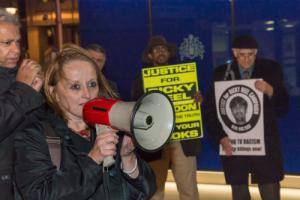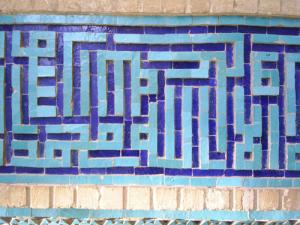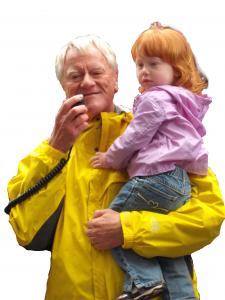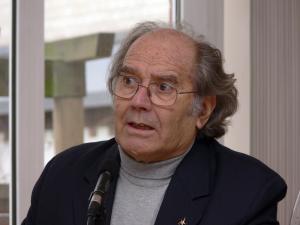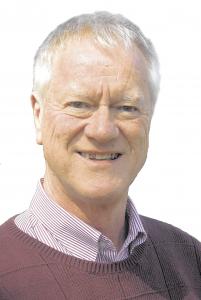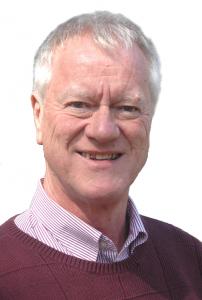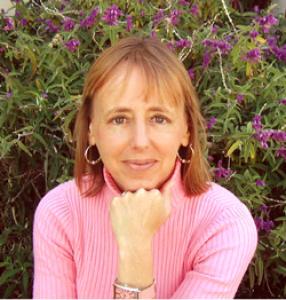Veggies Catering Campaign started in October 1984, when two Nottingham animal rights activists decided to present the manager of a local McDonalds with a huge veggieburger ‘to represent an ethical alternative to the products of death and destruction sold there’ (see Pat’s history of Veggies in PN 2514, published for the 25th anniversary in 2009). Since then, the group has gone from strength to strength, including catering for Peace News Summer Camp from 2009 onwards. Since Pat’s…
Interview
Liz Fekete is director of the seven-person Institute of Race Relations in central London. She is one of Europe’s leading authorities on racism, heading one of the most respected advocacy groups in the UK, a body which has published a rigorously radical journal, Race & Class, since 1974. That could sound intimidating. In person,…
‘I think fracking is entirely the wrong direction for UK energy policy, and I feel that if we act now we can prevent the establishment of a fracking industry in this country,’ Laura Bannister said.
Bannister is a European election candidate from Manchester and Salford, an area currently being exploratory drilled for natural gas. She has been a member of the…
Peace News: Firstly, a question that relates to the tension between the US and Iran and the threat of war. How does the persistent threat of war against Iran impact on its behaviour in the international sphere? How should the US and other nations—namely, the allies of the US like the UK—conduct international affairs with Iran to reduce this animosity?
Shirin Ebadi: Do you mean with Israel?
PN: Well, namely by the US and other allies of the US.
SE: America has never…
Consensus decision-making has become dominant in activist circles. Not everyone practises it, but almost everyone wants to be using it, or to lay some claim to be using it. Among some folk, consensus decision-making has become not only an essential part of social change, but a pre-condition of working in a group.
We discovered in earlier segments of this interview (PN 2544 and 2545), that US activist and trainer George Lakey was one of the people who helped spread the ‘affinity-group-…
Born in Buenos Aires in 1931, Adolfo Pérez Esquivel played a key role in the nonviolent resistance to the South American military dictatorships of the 1970s and 1980s. In 1977, he was imprisoned and tortured by the Argentinian military junta. Three years later he was awarded the Nobel Peace Prize. Ian Sinclair interviewed him, with Beverly Keene interpreting, when he visited London in April.
PN: During the 1970s and early 1980s, up to 30,000 Argentinians died in the so-called ‘…
George Lakey photo: john Meyer
Nearly 200 years ago, revolutionary English poet Percy Bysshe Shelley argued that poets were the ‘unacknowledged legislators of the world’. The poet ‘not only beholds intensely the present as it is, and discovers those laws according to which present things ought to be ordered’, Shelley argued, she also ‘beholds the future in the present’, and her thoughts are ‘the germs of the flower and the fruit of latest time’.
…We began with laughter, as George Lakey expressed his disbelief at the technology we were using. It was his first-ever internet video call: Skype had been installed on his computer only the day before, specifically for our interview.
Two hours later, with many questions still unasked, we were both on the verge of tears, as George haltingly recalled a transformational moment in his political and personal development, a process that stretches unbroken from the 1960s to his continuing…
Medea Benjamin. PHOTO: Code Pink
PN: What have been the main achievements of the US peace movement since 11 September 2001?
MB: Successes? We moved public opinion from being radically pro-war in the beginning – both in terms of attacking Afghanistan and Iraq – to being overwhelmingly anti-war within the first couple of years and made the war an issue during the presidential elections.
Building an anti-war movement that became…
Kosh, sub-editor, mid-20's: I am from a lower middle class family; I joined the protests and got beaten up several times and arrested once. Change takes time. People who were suppressing their desires so far have openly started putting their ideas forward. This is the beauty of democracy. Hopefully, things will improve soon.
Dinesh, 22, (ex-member of the revolutionary wing of the students' union Akhil Krantikari): Now I can freely go to other areas in Nepal,…
ZZZ: We try to walk the walk, whether we are challenging the Israeli occupation or resolving conflicts locally.
We're living in a pressure cooker. When you are confined to your home or your bantustan, when the economic situation is deteriorating, unemployment is skyrocketing, and trauma among children is increasing, abnormal conditions create abnormal relationships among people. They create displaced anger against each other.
Yesterday we were mediating conflicts between…
Jaime Huenun, an indigenous Chilean poet, has quoted from an old wise Mapuche called Manuel Rauque, "When we recover our past, the earth will open its secrets."
Let me briefly introduce you to our recent Chilean history, and then let some of the protagonists tell us their stories from their own perspective, to help us make sense of what happened and to build our own image of what resistance has meant for us and how it has shaped our culture and identity.
On 11 September 1973…
Roberta: Tell us a bit about your group, what you do and why you do it
Jesus: Our association, “Murcia Canción de Autor” (Murcia Songwriters)wants to give each person who wants to sing in public a chance to do so. We share our songs and ideas about the world and music in general and, in particular, “cancio'n de autor”. Participating in the homage to Victor Jara CD has been a collaboration with the Itaca co-op, with which we have been doing similar “homages”. This year we decided to…
On 11 September Ryans brother was killed in the attack on the Pentagon - where he was an enlisted specialist in the US army working as a multimedia illustrator. On 14 February 2002 - along with representatives of several other victims families - Ryan launched the Peaceful Tomorrows organisation.
PN: How and why did you start Peaceful Tomorrows?
Ryan: The horror of violence was never real to me before by brother was killed on 11 September, leaving behind a wife…
Karl Marx saw the red flag with Che Guevera’s silhouetted face on it on my bedroom door. Looking surprised he said: “Che. I read about his life. Tapain leh maanuhuncha? Do you respect him?”
I said yes, I did “respect” him. The question was so sincere that I didn’t feel right to add that Che had also become an over-hyped pop-art icon. It was kind of nice that this young man had no idea about that. Usually kids know the face without knowledge of the revolutionary stuff.
“And…



